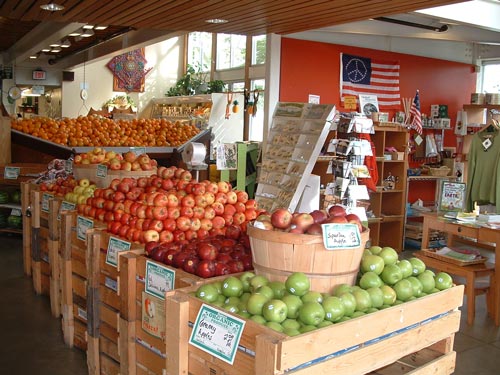
When most people think of organic food they think of spending lots of money. Yes, organic can be expensive, but it doesn’t have to be. There are ways of getting around breaking the bank on food that is without chemicals, pesticides, herbicides, fungicides, artificial flavors, sweeteners, and/or colors.
As someone who consistently purchases organic food and a former employee of Whole Foods, I can share a few tips about it.
- Purchase Store Brands: Many brand name organic products such as Amy’s Kitchen, Stonyfield Farm, and Muir Glen taste great, but you’re definitely going to pay an arm and a leg. Stores like Trader Joe’s and Whole Foods have their own line of organic products that taste just as good as brand names and sometimes taste better.
- Think Outside of the Box: Packaged products cost more than products that aren’t packaged. This reigns true for organic products as well. Gravitate towards whole foods and make your own meals.
- Shop Around: While Trader Joe’s and Whole Foods have several locations and are conveniently located, there are other stores that carry organic products. Check your local listings for organic and natural markets and also try your local farmer’s market.
- Don’t Be Afraid to Use EBT: Many assume that stores who carry organic products couldn’t possibly accept EBT, but they do. If you have EBT you should know that Trader Joe’s , Whole Foods, and other organic markets accept it.
- Participate in Community Shared Agriculture: Visit LocalHarvest.org to find a local CSA program near you. Most CSA programs have payment tiers and go buy income and family size. CSA programs accept EBT as well.
- Clip Coupons: Check your local Sunday newspaper for coupons. Once you get to the store of your choice check the door for coupons and specials. There are usually sales papers as soon as you walk in.
- Buy Bulk: Buying bulk won’t only save you a few trips to the grocery store it will also save you money. Non-perishables like beans, grains, lentils, and nuts are ideal for buying bulk.
- Shop Seasonal: You automatically save money by purchasing organic produce that is in season. Prices are always lower when there is a greater supply. Also, stock up. Most fruits and vegetables will last up to six months in the freezer.
- Grow Your Own Food: There’s no better way to tell if food is truly organic or not than growing it yourself. If you don’t have a backyard or an apartment balcony there are tons of community gardens popping up everywhere. LocalHarvest.org also has listings for community gardens.
- Get a Shopping Partner: Many people go in together on CSA and buying bulk with someone else. It saves money and it can also make the experience fun.







Wholefood’s 365 brand is a great bargain. In recent months, they’ve expanded it to include more products, such as a 32 oz. cold-pressed safflower oil for about $6 (about the same price as chemical pressed peanut oil and more per ounce). Their can of organic beans without chemical preservatives is cheaper the same price as another non-organic store brand with the preservatives. In addition, their bulk section–nuts, rice, quinoa, cereals, dried fruit, beans and flour–is a great way to say money. However, they’re quality produce remains quite high, in which I visit the farmers market and a CSA. These are great suggestions I’m always sharing with people. Thank you for writing it out!
it’s sad that whole foods is the only place to find organic food in grocery stores and trader joe’s is not to be trusted. they are on the recall list every day almost. expensive and not anywhere in black neighborhoods. good post but it doesn’t apply anywhere but affluent neighborhoods
@courtney: I’m not sure where you live but you may have other options:
Farmer’s Markets: You get to know the people growing your food and it’s fresh. Here in Chicago, ours take EBT and they’re in a lot of neighborhoods easily accessible by public transportation (I live in Bronzeville, a mixed-income black neighborhood, and we have one, but they’re also in the Loop, where most trains and buses run through).
CSA: Another option (if you’re like me and don’t have a car) is a CSA, which will deliver to your home or possibly your place of business. Mine delivers to a school down the street and I’m able to get a week’s worth of veggies for $24 a week from a local farmer (I use the CSA in the winter, when farmer’s markets are out of season).
The last option might be trying to start something within your community (maybe at a rec center or a house of worship, if you worship) where you pool your money and resources (maybe someone has an SUV and can retrieve the groceries and you pay them $5 for gas or something) and have someone pick up the groceries from another neighborhood. This may foster a sense of community, help those in need, and get better nutrition to everyone.
There absolutely need to be more fresh, healthy food options in all communities but until there are, we all have to get creative within the confines of our time, budgets, and resources. An investment in our health is an investment in our future.
I use a delivery service for organic fruits and veggies. The items are locally grown and everything comes to me ripe and ready to roll (plus it’s all so pretty). A small box that feeds 1-2 people for a week is about $28. I have a family of 5, so I buy a considerably larger box, but the cost is cheaper than running around from store to store to find what I need. Plus, I end up with things I’ve never used before, which forces me to find new recipes. Because my Whole Foods is about 7 miles away (and a budget buster, I might add), I tend to shop at Sprout’s and Fresh and Easy for other organic and preservative-free items. Plus, my local Fry’s has great organic/vegetarian/vegan foods sections. Shopping organic is definitely doable, but it still a challenge for me, and I’m deep in the heart of suburbia.
@Chris: I go this route, too, and I find it keeps my budget in check better than going to the grocery store, as I tend to pick up items that weren’t on the list when I do 🙂
Great List! I’d also add protesting price gouging and getting rid of Whole Foods all together but I’m a dreamer
what is EBT and CSA? a good writer should know that, writing should be done so the reader can understand unless of course you are targeting a selected group of people.
@Mabashi Shakashi: Thanks for the curiosity and comment Mabashi. If you ever inquire about a topic or term in one of our writer’s articles, we have a search function at the top of the homepage.
Hi,
Great tips!
What I did while I was living in Munich, Germany, was that I found on organic online store that was local and send everything to my home.
It was cheaper because they were purely an online store, and I ordered also bigger quantities.
This could be an option for some as well.
Have a great day!
Chris
Ordering organic food online saves a lot of money, especially when you buy from a company based near where you live. https://www.planetorganics.com is a company based near SF and they deliver all over the Bay Area and Northern California!